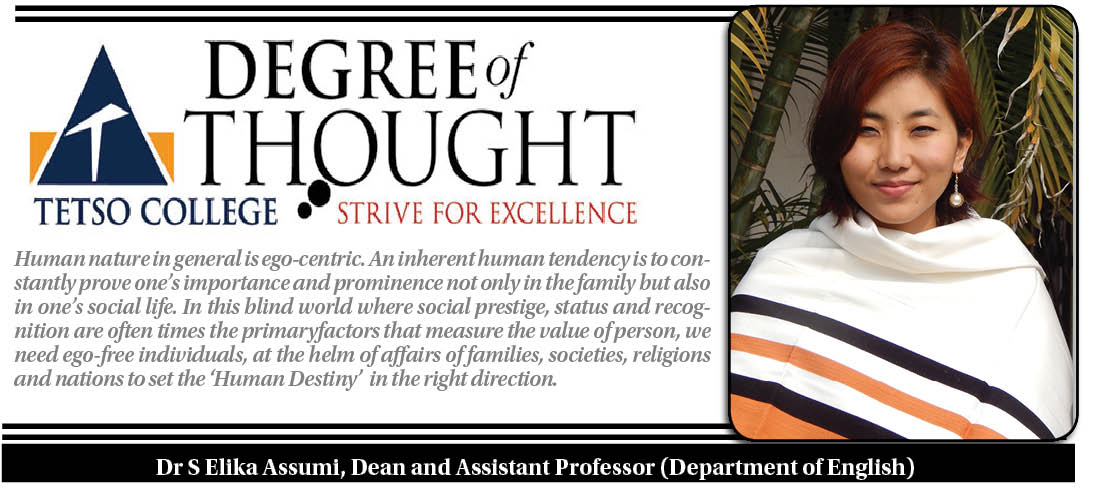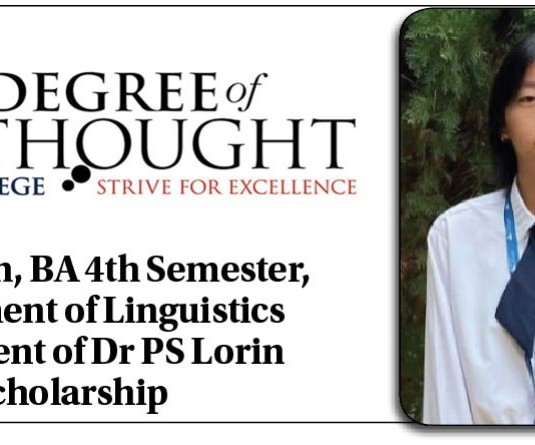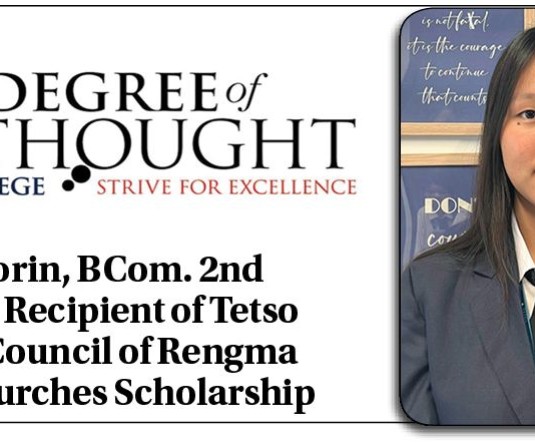2

Dr S Elika Assumi, Dean and Assistant Professor (Department of English)
“If your ego starts out, 'I am important, I am big, I am special,' you're in for some disappointments when you look around at what we've discovered about the universe. No, you're not big. No, you're not. You're small in time and in space. And you have this frail vessel called the human body that's limited on Earth.”
~ Neil deGrasse Tyson
The recent past has been peppered with reports concerning the state of the economy in the nation. The news would let us know that there is a slowdown of sorts, stopping short of terming it a ‘recession’. This ambiguity of our economy is followed by the customary glut of social media-driven furore ranging from ironic hashtags blaming millennials for not consuming enough, uncannily fortuitous and astonishing bank mergers, along with hopeful stimuli packages of high speed thrills of surfing the web waves and the well-thought out diatribes on the lack of structural reforms in the economy. There is no dearth of contentions in our world today.
The individual, as usual, seems far removed from these issues. One’s immediate concern informs the narrative, in our present local context, at least. And yet, even as things continue to change - not just in an idiomatic fashion - but materially and literally. On the subject of idioms, there are two common English idioms that come to mind when thinking about the economic aspirations, not of countries, but of its people. The first, “keeping up with the joneses”, perfectly highlights the current mindset that drives and motivates the unabated materialism that informs social status in our society. Everyone competes in the social sphere, but have we ever stopped to ask if it is a healthy competition? Now, right off the bat, a caveat - this is not to vilify the creation of wealth and goods, their accumulation and re-distribution - rather, it is to question whether in the majority of cases such materialism has been driven by individual hard-work, innovation, or honesty. Self-determination, nowadays, has become increasingly linked to material rather than political and moral expressions that may be neatly packaged in the sepia-toned hues of social media. A fascination (obsession?) with what others have has cultivated a mindset of envious comparison rather than healthy competition. The entire social class landscape seems morbidly informed by this kind of thinking - a covetousness, the end justifies the means, corrupt and impatient kind of materialism devoid of any of the teachings that the Commandments had once invoked, and devoid of any of the humanism that a more liberal and secular frame of mind might envision. Social status, at all and any cost - compounded by the normalisation of corrupt behaviours and practices, the justification of which one witnesses every day, but which one greets with an attitude of exhausted protest or fight.
It is here that a paradox emerges where one’s perception of social status and class - which are indeed abstractions - can only find articulation in materially-bound ways; in the size of the house, the land, the cars, the clothes, and overall, the money. Money, ill-begotten or not, becomes the benchmark of ‘keeping up with the joneses.’ This thinking also gets deeply embedded in the social hierarchies that emerge, in various ways, as privilege, prestige, status and the like. Those that cannot pay in the coin of wealth and prestige are characterised, wrongfully, as failures, or as inferiors. While there are also those who would make a pageantry of underscored ‘achievements’ in the form of felicitations in a public forum as it is ‘prestigious’ for that community; we are familiar with this common local practice. To this, we would do well to recall another well-known English idiom in being mindful of the extent and purpose of our personal material aspirations, namely, as being part of an unending and dehumanising ‘rat-race’. In the name of money and prestige, a more empathetic mindset is sacrificed, one that places an individual’s self-worth and self-esteem at the forefront and one that, crucially, is mindful of the means that are used to realise one’s ambitions and aspirations. We are all caught in this rat-race - an endless cycle of self-gratifying achievements and trophies - the question is, at what or whose cost?
In the gravity of the life we live today, we are more than often encountering what seems to be an overwhelming leaning towards the grim and the dismal; each day, we are made aware of what a profoundly degenerate species we are and no one is spared the thorns of existence as dredging through the everyday is bad enough. And yet, the strange thing about existing in the chaos is that, it might still be possible to live lightheartedly. The fact that each morning, we ruminate the ‘felicitations’ section in the dailies with gasps of exasperation as well as admiration, to patiently endure the unjustified pain of traveling the highway pits of hell each day, to see the imperfection of everything everyday and scamper to find ways to mend the quandaries, to greet the night’s rest knowing that the cycle will return the next morning - it is precisely because we know the flaws so well that it is not naïveté to ignore them by being lighthearted. To be aware of the flaws also means to have the capacity to make them better, and to squarely push forward defiantly - against all odds. One can only get to this point by registering the heaviness of the chaos and ironically transcending it with a truthful lightheartedness. It would be good to remind ourselves that we are but a mere speck in this cosmic grandeur and are often deluded by our fiendish ego in a bid for social prestige, privilege and status.
Degree of Thought is a weekly community column initiated by Tetso College in partnership with The Morung Express. Degree of Thought will delve into the social, cultural, political and educational issues around us. The views expressed here do not reflect the opinion of the institution. Tetso College is a NAAC Accredited UGC recognised Commerce and Arts College. The editors are Dr Hewasa Lorin, Dr. Aniruddha Babar, Noyingbeni T. Erui, Meren and Kvulo Lorin. For feedback or comments please email: dot@tetsocollege.org.






